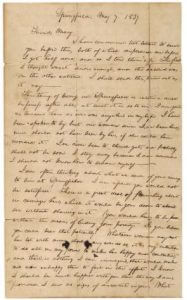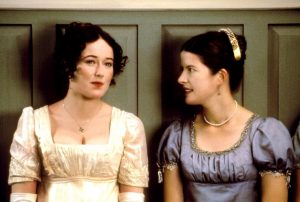“I’m just afraid she likes me too much,” he confided to a mutual friend.
A few weeks earlier, I had wondered the same thing about him. Fresh out of an abortive attempt at a relationship, I didn’t want to hurt his feelings or ruin our friend group. But his charm, compliments, and habit of hugging me and asking me, “How’s my favorite person?” won me over. I decided to take his apparent interest as a good thing.
After I’d already decided that this was a relationship I might want to give a shot, he started to leave my text messages on the dreaded read.
With some prodding from me and under the influence of pain medicine, our mutual friend let me in on their conversation, admitting that he’d decided he wasn’t interested in me. I seethed internally, wondering how he could say that after giving me so much encouragement. But I’d already asked him to our school’s version of Sadie Hawkins, so I swallowed my pride, and—with some trepidation—I went with him anyway. About a month later, he was dating someone else to my surprise—and to the surprise of many of our friends.
The summer after, I shared the story with another guy. He shook his head and said, “This guy reminds me of me when I was younger. You deserve to be treated better than that.” A few days later, we broached the subject again. This time, he looked me in the eye and said, “You’re so beautiful, Ella. You’re an authentic Catholic woman, and you ask people to live up to a higher standard. You deserve to be treated so well, and a man who deserves you will step up and do that.”
When a beautiful boy with sparkling eyes and a flashing white smile tells you that you’re beautiful and valued, it’s easy to get lost in his eyes—easy to expect him to treat you the way he described.
The relationship did not improve from there; we would undergo two painfully awkward DTRs—where I would ask him to either commit or stop flirting with me, and he would claim to be unable to commit to anyone. It ended in tears for me, but for him a relationship with another girl would begin two weeks later. When I overheard him talking about this girl, I was stung to hear him emphasize that it was “casual” and “relaxed.” He quite clearly wanted someone who didn’t care as much as I did—or at least didn’t show it.
Honest Abe's romantic fumbles
A quick internet search reveals that I’m not alone. Girls all over the world have experienced the same feelings and the same rejection as me. The belief that it’s somehow unattractive to show interest is all over popular culture—and it’s even within the pages of my history textbooks.
In 1838, a twenty-nine-year-old, Abraham Lincoln described a romantic mishap to his friend, Mrs.
Orville Browning, in a letter. In 1826, a friend of Lincoln’s suggested he marry her sister, Mary Owens, and she offered to bring her sister back to Springfield so he could see more of her. Before Lincoln saw Mary again, he described her as “intelligent and agreeable.” But Lincoln changed his tune when she arrived. Lincoln writes,
“This stomached me a little; for it appeared to me, that her coming so readily showed she was a trifle too willing.”
Lincoln immediately started to fixate on her faults. He called her fat, and he cuttingly remarked that “she now appeared a fair match for Falstaff (the fat, vain, and drunken friend of Prince Hal in Shakespeare’s Henry IV and Henry V).” But Lincoln felt honor bound to marry her, so after he had put off the odious task for as long as possible—for a year—he proposed. To his shock, she refused him. In a move that reminded me strikingly of Mr. Collins from Pride and Prejudice, he says, “I supposed she did it through an affectation of modesty.” He asked and was denied three more times.
After he was fully rebuffed, Lincoln writes, “I began to suspect that I was really a little in love with her.”
After this disappointment, Lincoln swore off of women, but years later he married Mary Todd.
Somewhere along the line it became cool not to care
The phenomenon that Lincoln so amusingly illustrated has a sociological name. It’s called the Principle of Least Interest, and the Encyclopedia of Sociology defines it as “The generalization that, in any relationship, the person who cares least about maintaining it is in the best bargaining position.”
Until I came across Lincoln’s letter in my Civil War class, I always thought this was a modern problem. Countless articles and blogposts discuss the dating situation it has created. Both men and women play a game where they try to appear uninterested. The rules are endless: don't call too soon, don't be the first to send a text message, don't send more than one text message in a row, don't be the first to clearly express interest. In 2015, Vanity Fair explored the situation in the context of Tinder and the Hookup culture (warning: the article contains detailed discussions of sex).
But it was a Relevant Magazine article by Patreeya Prasertvit that resonated most for me.
When someone rejects us, we retort that we didn’t care anyways. We play it safe, we ambiguously hang out until we are sure our affections are returned. Because somewhere along the way, showing that you care too much, too soon, became terribly uncool.
Losing a game you never wanted to play
While women can be the person in the relationship who cares less, that doesn't appear to be the norm, and it has not been my personal experience. I see an undeniable pattern in my life of men who show obvious interest, but when I mirror their interest, they turn weird and act like they never liked me.
In each situation, I had played my cards too early; I hadn't followed the rules of the game. Instead of playing it cool, I honestly let each guy know that I was interested. It's in my nature to be direct.
What's the solution?
I have to ask myself what went wrong? In Pride & Prejudice, written in 1813, Charlotte Lucas tells Lizzie that "In nine cases out of ten a woman had better show more affection than she feels. Bingley likes your sister undoubtedly; but he may never do more than like her, if she does not help him on." But twenty-five years later, Honest Abe criticize a woman for being "too willing." Somewhere along the line, love became a game and people's feelings began something to play with.
But my feelings echo Prasertvit's, who writes, "I don’t think we can really win until we are willing to fold, to leave the game and remember that love is much bigger than a power struggle. Otherwise we approach romance with fear, with insecurity, with a need to control and predict, with armor on."
I'm not sure how this problem can be fixed. But I know that I refuse to play with other people's feelings—I choose sincerity.
And in case you're coming away with a bad opinion of one of our most beloved presidents, know that Lincoln was self-aware. He concluded his letter with, “Others have been made fools of by the girls’ but this can never be with truth said of me. I most emphatically, in this instance, made a fool of myself.”
Can the same be said for the rest of us?




